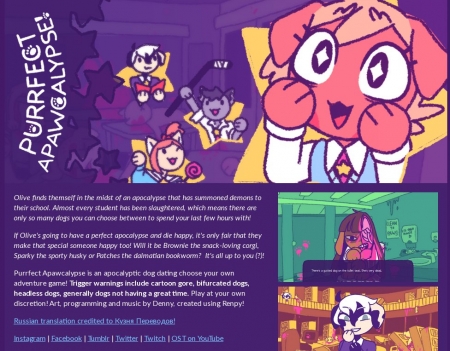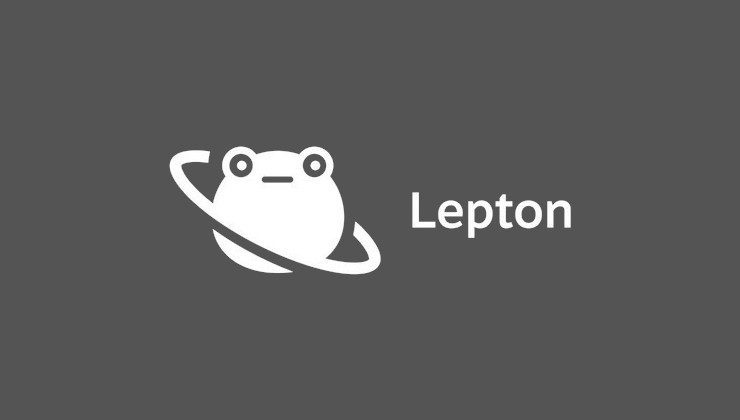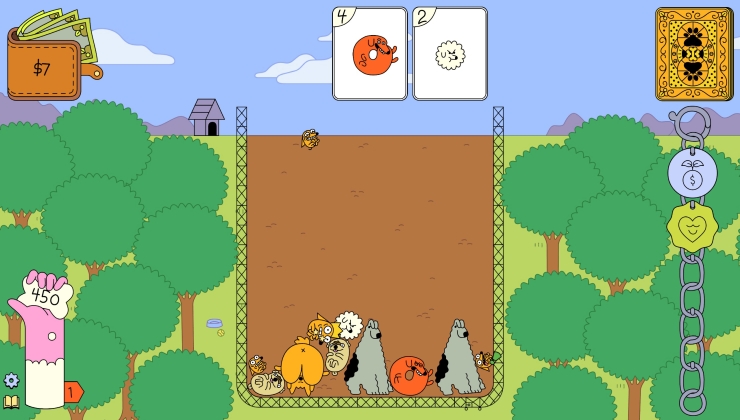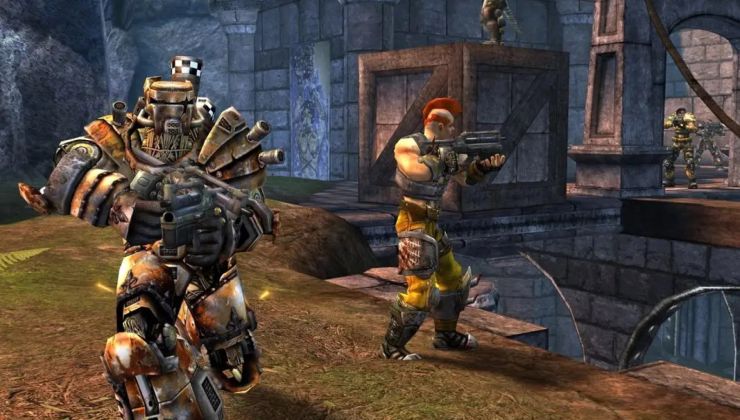The creator of indie store itch.io has issued a warning to game developers, as Chooseco appear to be trying to take down anything using the 'choose your own adventure' phrase.
Not surprising it's happening though, Chooseco went after Netflix for using the same phrase with Black Mirror: Bandersnatch. Speaking on Twitter, itch.io founder Leaf Corcoran stated:
Warning to any devs using the phrase "choose your own adventure" to describe their games, Chooseco is issuing takedown notices to @itchio for trademark infringement. Example game page they went after:
In a follow up Twitter post, Corcoran mentioned the person issuing the notices on behalf of Chooseco has been "difficult" and it comes across like they're essentially trolling. This is what happens though, often too, there's legal trolls everywhere. Some companies are set up just to go around sending off trademark notices on junk. I find it completely ridiculous that any company can trademark something like 'choose your own adventure', it just seems crazy to even allow that.
Regardless of how insane it is that such a thing can happen, game developers do need to come together and come up with something else they can use instead. Perhaps someone can then protect it themselves on the basis that anyone can use it, much in the spirit of open source eh? Can you think of a fun phrase that would fit? Let's see what you've got in the comments.
Can you think of a fun phrase that would fit?"Select Your Own Endangerment"? :D
Last edited by vildravn on 9 Dec 2019 at 7:47 pm UTC
I do note that they're also going after Netflix, which suggests the company might have gotten involved with a lawyer (or firm) that's using this as an opportunity to grab some settlement cash.
I really think they are just betting on the fact that small devs have no funds to defend themselves against these trolls.
I agree with the first comment that IP law needs an overhaul and urgently so.
Quoting: KimyrielleI agree with the first comment that IP law needs an overhaul and urgently so.There needs to be much harsher repercussions for abusing the law like that. As far as I know there's not any, so you can just throw accusations and takedown notices around and see what sticks.
Fortunately at least in these cases the answer is pretty trivial: just don't use the exact phrase "Choose Your Own Adventure." Ryan North settled on "Chooseable Path Adventures" for his excellent Shakespearean "To Be Or Not To Be" and "Romeo and/or Juliet" books (both of which I'd highly recommend, fwiw).
Edit: Oh, and also in this case, even if the trademark holders aren't coming out with any new official CYOA books (that I'm aware of), it is still an active brand; not too long ago they started making board game versions of some of the original titles. Unfortunately they're pretty bad, but they're not totally dormant. https://boardgamegeek.com/boardgame/251420/choose-your-own-adventure-house-danger
Last edited by apocalyptech on 9 Dec 2019 at 8:58 pm UTC
I hope this blows up in their face.
Quoting: KimyrielleI am no IP lawyer, but this seems so blatantly unlawful that it's not even funny. Trademarks on common words usually apply only to very, very specific uses. Such as Apple can claim the right to that trademark for electronic devices, but they can't prevent a grocer from calling that edible round thing an "apple".These small devs should all band together.
I really think they are just betting on the fact that small devs have no funds to defend themselves against these trolls.
I agree with the first comment that IP law needs an overhaul and urgently so.
Maybe a crodwfund for defense team.
Alone they can't do anything but together they might be a force to recon with.
Last edited by razing32 on 9 Dec 2019 at 9:40 pm UTC
Last edited by Tchey on 9 Dec 2019 at 9:18 pm UTC
Quoting: NezchanIt's a pity that "Varytale" was already used by an interactive Fiction engine. That would have been a great genre term.That really is a shame, that's an excellent term.
With trademark claims like this one, the more specific the wording of the trademark is, the less specific its application has to be. It follows that the less specific the wording is, the more specific the application has to be. So a one generic word trademark, like "Apple" (not very specific), is only trademarkable in a very specific context. On the other hand a specifically worded clause such as "Choose Your Own Adventure" can have a wider latitude of application. If the company is still around trying to use the trademark, then they must try to enforce it.
On the other hand, Monster Cable has been trying to trademark the word "monster" in almost any context for several years now. Part of their effort seems to be nuisance lawsuits aimed at large companies that they offer convenient settlements for, which are less trouble than going to court. Their lawsuits are a real trademark travesty, and you wouldn't expect them to hold up for a minute if one of the companies sued (who aren't selling cables) actually took the trouble to take them to court rather than going for the expediency of the settlement.
However, the Life Is Good company has managed to trademark the phrase "Life is good" at least for use on t-shirts and coffee cups, even though the phrase seems to have been fairly common in English and been too generic to trademark before they started using it. That trademark seems ridiculous to me, but it has stood up. Compared to that trademark, "Choose Your Own Adventure" would seem to be obviously legitimate.
Last edited by CFWhitman on 9 Dec 2019 at 10:18 pm UTC
And yes, you can trademark a colour.
Quoting: CFWhitmanTo be honest, this sounds like a fairly legitimate claim to me. The "Choose Your Own Adventure" series of books was pretty popular in the eighties, and everyone knew that the phrase referred to a very specific series of books. That phrase did not exist in English before those books came out. Some competitors released similar material, but they had to use a different name.The thing is, the ability to trademark some words isn't related to whether you "invented" or popularized those words. Otherwise Apple couldn't be a trademark. So I don't think this adds to the legitimacy of the claim.
Last edited by hagabaka on 9 Dec 2019 at 10:21 pm UTC
Quoting: hagabakaThere are several factors involved, but originality is a big one. If another company had already sold a line of computers they referred to as "Apple" computers, then Apple couldn't have trademarked their name.* As I explained before, the more original the trademark is, the wider a scope it can cover. The less original it is, the narrower the scope it must be limited to, and it always must be original to its scope. So yes, originality is a factor in trademark cases.Quoting: CFWhitmanTo be honest, this sounds like a fairly legitimate claim to me. The "Choose Your Own Adventure" series of books was pretty popular in the eighties, and everyone knew that the phrase referred to a very specific series of books. That phrase did not exist in English before those books came out. Some competitors released similar material, but they had to use a different name.The thing is, the ability to trademark some words isn't related to whether you "invented" or popularized those words. Otherwise Apple couldn't be a trademark. So I don't think this adds to the legitimacy of the claim.
*Apple actually did have a lawsuit on its hands when they created the Apple Music service, because Apple Records existed before Apple Computers.
The CYOA company is probably just angry because unlike Kleenex and others, a lot of people don’t even realize that it’s a brand and not a generic term, so they don’t get as much promotional value from other companies keeping the term alive.
Quoting: SalvatosPeople who make CYOA-like books and their derivative digital versions have already come up with a variety of non-infringing terms for them. Off the top of my head, there’s gamebook, adventure book, interactive fiction/story/adventure/novel, choose your own ending/story/path...Keep in mind too that the lawsuits and threatened lawsuits are pretty recent. The books themselves were published back in the 1970s and 80s, and it wasn't until about 2003 that the original author started a company to re-publish them and make new ones that it became an issue. Notably with a lawsuit against a car company for using the phrase "Choose Your Adventure" in its advertising.
The CYOA company is probably just angry because unlike Kleenex and others, a lot of people don’t even realize that it’s a brand and not a generic term, so they don’t get as much promotional value from other companies keeping the term alive.
All that makes it look like something a bit more shady than due diligence.
*prepares paperwork to trademark key English phrases and force all Americans to speak German instead*
Last edited by Purple Library Guy on 10 Dec 2019 at 3:43 am UTC













 How to setup OpenMW for modern Morrowind on Linux / SteamOS and Steam Deck
How to setup OpenMW for modern Morrowind on Linux / SteamOS and Steam Deck How to install Hollow Knight: Silksong mods on Linux, SteamOS and Steam Deck
How to install Hollow Knight: Silksong mods on Linux, SteamOS and Steam Deck